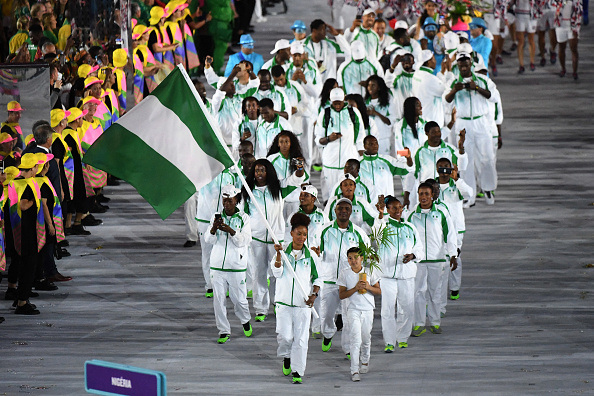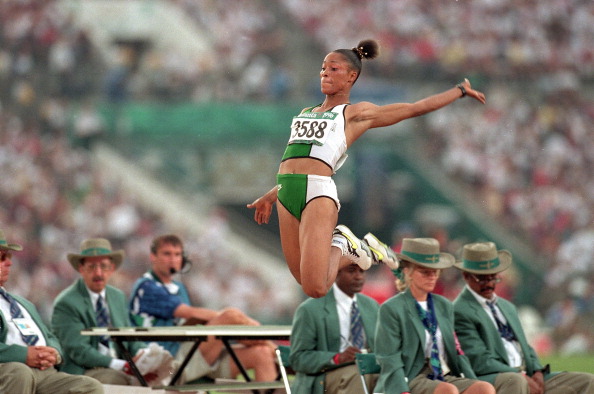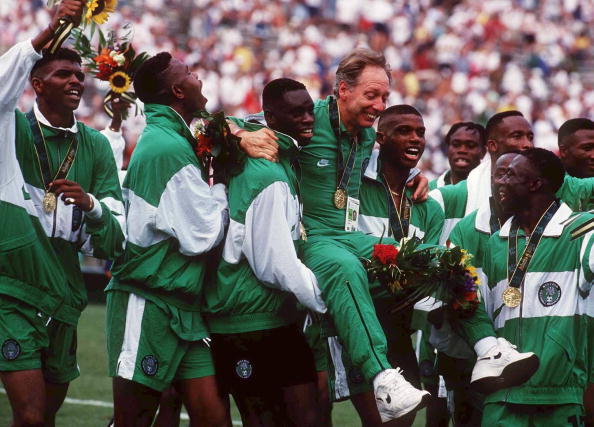Nigeria has always been regarded as one of Africa’s most sport-inclined nations, with a track record of successes in various fields and events to back its claim.
With a population of over 200 million people, Nigeria as a nation is always expected to perform well in any sports event, with a wide array of domestic and international talents at its disposal.
With the Paris 2024 Olympics edging ever closer, Afrosport reminisces on Nigeria’s best-ever outing at the Summer Olympics, which evidently was the Atlanta 1996 Olympic Games, where they brought home six medals—two gold, one silver, and three bronze medals—the most in the country’s history.

The story so far…
Nigeria’s first-ever appearance at the Olympics was in 1952 in Helsinki, Finland, where nine athletes represented the nation and failed to win a single medal in the Games.
Historically, the team has failed to win a single medal in seven different outings, as recently as the 2012 Olympic Games in London. Meanwhile, the West African nation only failed to qualify for the Games in 1976 in Montreal.
Nigeria, however, has won 27 medals in total since their first appearance 72 years ago: three gold, 11 silver, and 13 bronze medals.
Since the 1964 Games in Tokyo, where only 18 athletes represented the country, Nigeria has not taken less than 20 participants to any edition of the Olympics, with the 2024 Games in Paris expected to witness their highest number of representatives, with 88 athletes tipped to represent the country.

Success in Atlanta…
Nigeria headed to the Olympic Games in Atlanta in 1996 without a gold medal in their ten previous outings. Sixty-five athletes set out to change the nation’s history when they journeyed to the United States to compete in nine sports, with the legendary Mary Onyali acting as the flag bearer.
Team Nigeria got its first medal of the Games, a bronze medal in the women’s 400 metres event, through Falilat Ogunkoya, who finished in third place in a time of 49.10 seconds.
Three days later, Onyali got Nigeria’s second medal, a bronze medal in the women’s 200m event, clocking a time of 22.38s.
Meanwhile, on August 2, Duncan Dokiwari got another bronze medal for the team, this time in the Super Heavyweight category in men’s boxing.
However, Nigeria’s biggest moment in the history of the Games emerged later in the day when Chioma Ajunwa clinched the country’s first-ever gold medal in the Olympics, when her recorded jump of 7.12 metres in the long jump event helped her clinch top spot.
The then 25-year-old Ajunwa etched her name in the annals of national and Olympic history by becoming the first Nigerian to win Olympic gold as well as the first black African woman to win an Olympic gold medal in a field event.
Moving on from Ajunwa’s success, the quartet of Bisi Afolabi, Fatima Yusuf, Charity Opara, and Falilat Ogunkoya claimed the silver medal in the women’s 4 x 400 m relay event on August 3, ensuring that Ogunkoya departed the Games with two medals.

More history was made for Team Nigeria when the men’s u-23 national team achieved an almost impossible feat to win the gold medal in the football event after coming back twice to beat favourites Argentina 3-2 in the final.
The success Team Nigeria achieved at the Atlanta ’96 Olympics has not been replicated by the numerous contingents of athletes that have represented the country at the Olympics, earmarking it as the country’s most enjoyable outing in the world’s biggest sporting fiesta.
Hunt for Paris Glory…
With 88 athletes now ready to fly the colours of Nigeria high at this summer’s Games in Paris, many Nigerians are hoping the star-studded contingent of athletes can replicate the success enjoyed 28 years ago and probably even surpass it.
The torch has now been passed to the likes of hurdles queen Tobi Amusan, long jump star Ese Brume, African Shot Put champion Chukwuebuka Enekwechi, and a host of other upcoming stars as the new crop of names strive to paint a new story on the historical canvas that was first designed by the heroes of Atlanta ’96.







